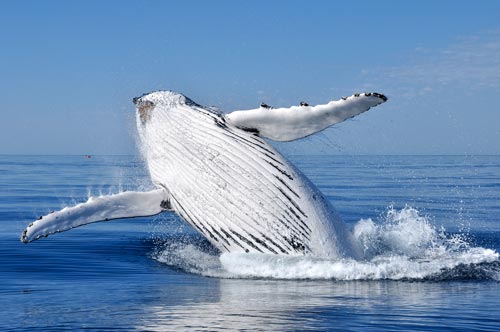For Immediate Release, January 6, 2015
New Regulations Will Prohibit Fish Imports That Fail to Meet U.S. Standards for Marine Mammal Protection
NEW YORK — In a landmark settlement reached yesterday, the U.S. government agreed to adopt new rules that ensure seafood imported into the United States meets high standards for protecting whales and dolphins. The long-delayed regulations will require foreign fisheries to meet the same marine mammal protection standards required of U.S. fishermen or be denied import privileges, thus implementing a 40-year-old provision of the Marine Mammal Protection Act.
“The public demands and the U.S. can — and by law, must — wield its tremendous purchasing power to save dolphins and whales from foreign fishing nets,” said Todd Steiner, biologist and executive director of Turtle Island Restoration Network. “We have the right to ensure that the seafood sold in the U.S. is caught in ways that minimize the death and injury of marine mammals.”
Each year more than 650,000 whales, dolphins and other marine mammals are caught and killed in fishing gear. These animals are unintentional “bycatch” of commercial fisheries and either drown outright or are tossed overboard to die from their injuries.
Despite U.S. efforts to protect marine mammals in its own waters, fishing gear continues to pose the most significant threat to whale and dolphin conservation worldwide. For example, the critically imperiled vaquita — the world’s smallest porpoise — is being driven extinct by shrimp gillnets in Mexico’s Gulf of California. Fewer than 100 vaquita remain. But under U.S. law and new regulations, shrimp from this region would be barred from entering the United States as it does not meet the more protective U.S. marine mammal protection standards. These standards may include modifying fishing gear and closing fishing in some areas to limit the risk of entanglement.
“The new regulations will force other countries to step up and meet U.S. conservation standards — saving hundreds of thousands of whales and dolphins from dying on hooks and in fishing nets around the world,” said Sarah Uhlemann, senior attorney and international program director of the Center for Biological Diversity. “The U.S. government has finally recognized that all seafood consumed in the United States must be ‘dolphin-safe.’ “
Since 1972 the U.S. Marine Mammal Protection Act has prohibited the United States from allowing seafood to enter the country unless it meets U.S. whale and dolphin standards. Under today’s settlement, the federal government must make a final decision by August 2016 about how to implement this requirement and end unlawful imports. The rules will protect marine mammals and level the playing field for U.S. fishermen.
Americans consume 5 billion pounds of seafood per year, including tuna, swordfish, shrimp and cod. About 90 percent of that seafood is imported and about half is wild-caught.
“It’s time to do what it takes to save thousands of whales and dolphins around the world, and hold our fish imports to the same standards that we require of our U.S. fishermen,” said Zak Smith with the Natural Resources Defense Council. “This law will help do that. It provides real, enforceable protections for marine mammals and sets up an even playing field that allows our fishermen to be competitive in the U.S. market. If we’d had these standards 40 years ago, we wouldn’t be scrambling today to save the imperiled vaquita. Thankfully, if this law is implemented, other species won’t share their fate.”
Today’s settlement was in the U.S. Court of International Trade in New York on behalf of plaintiffs Center for Biological Diversity, Turtle Island Restoration Network and the Natural Resources Defense Council.
Turtle Island Restoration Network is an international marine conservation organization headquartered in California whose 150,000+ members and online activists work to protect sea turtles and marine biodiversity in the United States and around the world. Visit us at Seaturtles.org
The Center for Biological Diversity is a national, nonprofit conservation organization with more than 800,000 members and online activists dedicated to the protection of endangered species and wild places. http://www.biologicaldiversity.org.
The Natural Resources Defense Council (NRDC) is an international nonprofit environmental organization with more than 1.4 million members and online activists. Since 1970, our lawyers, scientists, and other environmental specialists have worked to protect the world’s natural resources, public health, and the environment. NRDC has offices in New York City, Washington, D.C., Los Angeles, San Francisco, Chicago, Bozeman, Montana, and Beijing. Visit us at www.nrdc.org and follow us on Twitter @NRDC.




